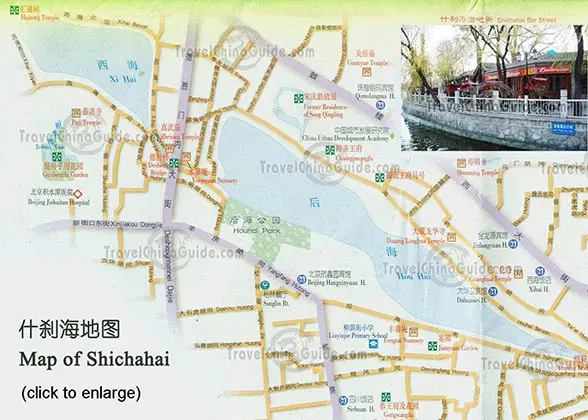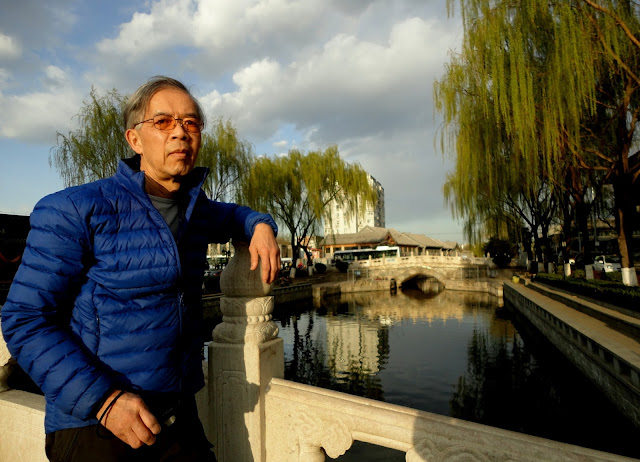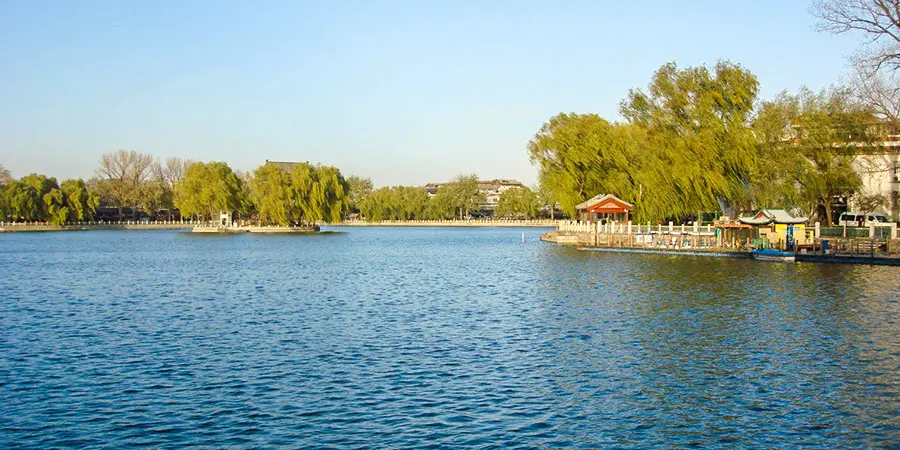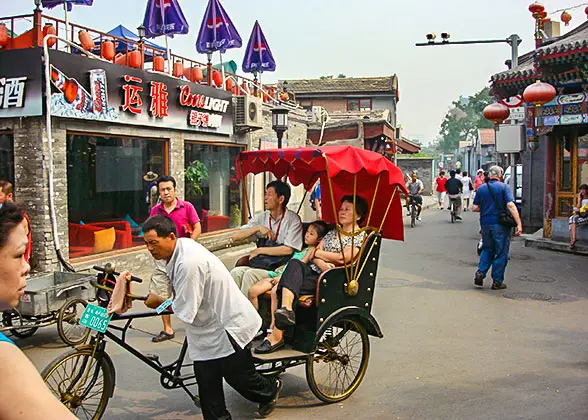Thăm vùng Shichahai có 3 hồ đẹp Houhai, Xihai và Quianhai
nằm về phía Tây Bắc của Beijing
các cô Đại Hàn du Xuân
tháng 4 có hoa đào đua nở
Shichahai Tea and Bar street
trông như người thật
ai cũng muốn chụp chung
ông chú họ Trương
đến nghe các cụ già chơi nhạc cổ truyền
Shichahai
Shichahai is a famous scenic area in the northwest part of Beijing, that includes three lakes (Qianhai, meaning Front Sea; Houhai, meaning Back Sea and Xihai, meaning West Sea), surrounding places of historic interest and scenic beauty, and remnants of old-style local residences, Hutong and Courtyard.
Its history can be traced to as far back as the Jin Dynasty (1115 - 1234). During the Yuan Dynasty (1271 - 1368), it was the terminal point of the Great Canal, which was a main reason for its prosperity. In the period of the Ming Dynasty (1368 - 1644), when the channels ceased to be as smooth as they used to be, it changed from a bustling hub to a place of leisure where people could stroll around to admire the vast scenery or enjoy the cool shade under williow trees.
 |
Click to enlarge the above Shichahai Map
|
Shichahai is always a good place for local residents' recreational life, and in the last 200 years, many governmental officers, celebrities, monks and nuns chose to build mansions, temples and nunneries in it. Thus, its attraction lies not only in its natural beauty, but also in the historical value of its architecture. The most famous ones among these historical buildings are Prince Gong's Mansion (Gong Wang Fu), Price Chun's Mansion (Chun Wang Fu), the Former Residence of Song Qing Ling, the Former Residence of Mei Lan Fang (the well-known Peking Opera master) and Guang Hua Temple.
The greatest point of interest in it today is its residences, Hutong and Courtyard. Visiting Hutongs by pedicab has become a popular activity for visitors from China and abroad. The most famous is Jin Si Tao, which actually includes 18 hutongs and keeps the original layout. Another one is Skewed Tobacco Pouch Street (Yandai Xiejie), meaning an oblique street which looks like a long-stemmed pipe. This street used to be a famous street selling long-stemmed pipes. In the east area, South Gong and Drum Lane (Nanluogu Xiang) is an interesting hutong renowned for its long history, culture, specialty stores and distinctive foods.
|
|
People can also find two Old Brands here. One is Kao Rou Ji, a restaurant selling roast meat, which has a history of over 150 years. The other is Bao Du Zhang, which has sold cooked tripe of sheep for four generations.
By visiting it, visitors will get an authentic taste of the style and features of Old Beijing.
As it is close to the Bell and Drum Towers and the north gate of Beihai Park, visitors can take buses reaching either of them and then visit Shichahai:
Take Subway Line 6 and get off at Beihai North Station. Get out of the station from Exit B and walk along Di'anmen Xi Dajie to the east till you see the gate of Hehua Market (Lotus Market).
Take Bus 612, 90, 701, 118, 204, 623, 42, 107, 13, 111,609 and get off at Beihai Beimen (north gate of Beihai Park) or 60, 124 at Gu Lou (Drum Tower). Beihai Beimen Station is close to Lianhua Market where there are many pubs and the rickshaw tour starts. Gu Lou Station is close to Yandai Xiejie.
Shichahai Biking: starts from the Drum Tower and ends at Dashibei Hutong
Shichahai and Houhai Hutongs: One day trip to savor the traditional lifestyle of Beijing
More Beijing Tours

































































































































